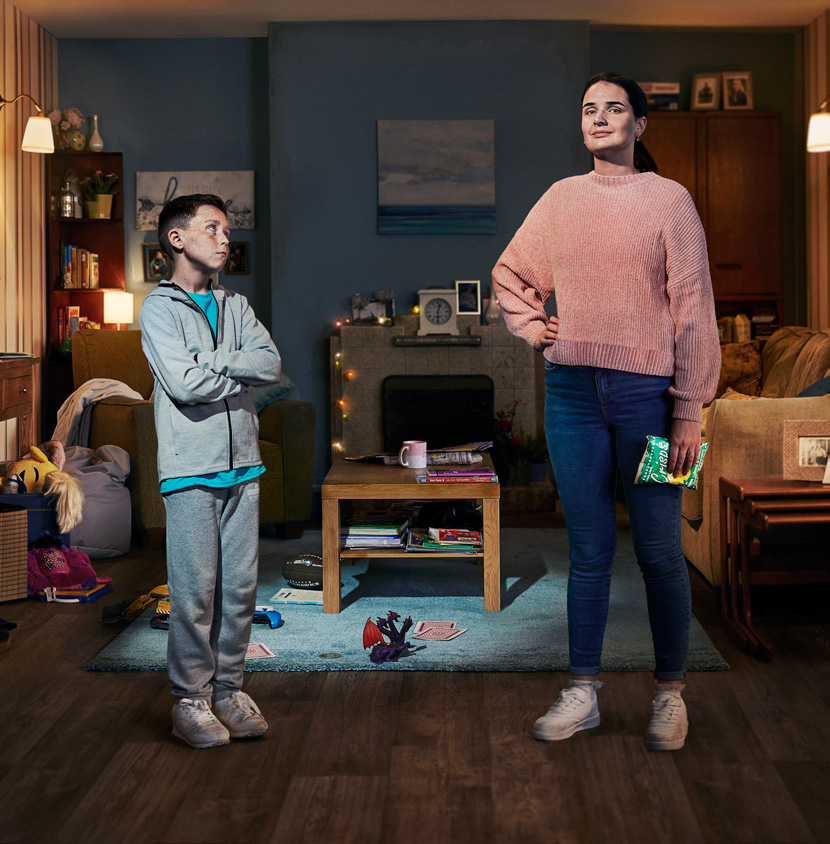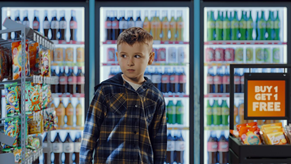START campaign says that parents who say no to treats are heroes

Social norms, constant availability, price promotions and routine treating makes this a huge challenge for parents.
- Social norms, constant availability, price promotions and routine treating makes this a huge challenge for parents.
- A fifth of calories in children’s diets* now come from foods high in fat, sugar and salt, around ten times more than recommended.
Tuesday 22 October, 2019. A new research report[i] from safefood in support of the START campaign has revealed that although it’s recommended that treats are eaten occasionally, in reality only 6% of parents said that they gave treats rarely, while 12% give treats at least once a day. The research led by University College Dublin, also found that parents gave children food treats for a variety of reasons; these include to reward good behaviour (42%), because children asked for them (42%) or to make children feel better (29%). Parents involved in the research also found treats unavoidable – from being a consistent part of celebrations and occasions, to post-activity snacking, to being ever-present while supermarket shopping. Previous research has shown that foods like biscuits, crisps, chocolate and sweets are the second-most consumed food group by children and almost 25% of all meals now include food and drinks high in fat, salt and sugar (HFSS) that are not recommended as part of a healthy diet.[ii] That research also found that 29% of children’s afternoon and evening snacks are foods high in fat, sugar and salt.
The latest phase of the START campaign from safefood, the HSE and Healthy Ireland acknowledges that to go against the norm, protect their children and say no to treats, ‘It takes a hero to be the bad guy’. Parents need strength and encouragement from everyone to say ‘no’ – from friends, family, grandparents and child-minders, to health professionals and wider society. The campaign focuses on the critical moment when a child asks for a treat and how a parent needs to take a brave stand of saying no in an effort to cut down on treats.
Dr Marian O’Reilly, Chief Specialist in Nutrition, safefood said:
On average, foods that are high in fat, sugar and salt – treat foods – now make up about a fifth of what our children eat and have gone from an ‘occasional food” to an everyday food. The short-term impact of this is that children don’t get all the nutrients they need for growth and development such as iron and calcium. These foods are also linked in the short-term with poor dental health and in the longer term with many chronic conditions. We struggle to avoid these treat foods every day because they are available everywhere, highly palatable, cheap and frequently on special offer. We also know from our own previous research[iii] that one third of foods on promotion are high in fat, sugar and salt.
Sarah O’ Brien, HSE national lead on the START campaign continued: “What we hear from parents in this research is that unhealthy treat foods are everywhere, every day. We can give parents tips and skills to help them deal with ‘saying no’ and cope with the pushback they are likely to see from children when they introduce changes. We also have to recognise that it’s sometimes easier for a parent to give in to the treat when they themselves are too tired to ‘say no’ or prepare a healthier option. It’s not easy, but taking small steps will make improvements over time that will start children on the way to a healthier life.”
Peadar Maxwell, Psychologist with the HSE added: “Parents have so much power to influence their children’s health and snacking habits. Practical steps include having less treats available in your home and offering healthier snacks makes it so much easier to bridge that gap between wanting to be a hero and feeling we have to give in. Shifting rewards for good behaviour from food treats to praise, a hug or a game, and giving attention to our children when they chose healthy snacks, all help too. It never helps when we beat ourselves up, so if you do give in, don’t despair. Instead, reflect on what happened and decide what you can change for the next time. It’s really important to stay positive and if treats are a long-term habit, it may require patience for healthy snacking to become the norm.”
The START campaign aims to support parents in getting small daily wins in achieving a healthy diet and lifestyle for their child. Parents can find ten tips for reducing treats and more support and practical tools to reduce treats including videos and advice on how to make a healthy, positive start on the START campaign website www.makeastart.ie
- Ends -
For more information or to request an interview, please contact
Wilson Hartnell PR
Clodagh Hogan
Tel: +353 1 669 0030
Mob: +353 87 7746128
Email: [email protected]
safefood
Dermot Moriarty
Mob: +353 86 381 1034
Email: [email protected]
Editor's notes
The START campaign is a five-year public health awareness campaign from safefood, the HSE and Healthy Ireland. The campaign is encouraging families to take the first step towards a healthier lifestyle for their children by supporting them with one daily win and to persist with the changes, no matter how difficult they become. To find out more about the START campaign and ways to make a healthy, positive start visit www.makeastart.ie
In identifying the positive starts that parents and families can take, the campaign advertising focuses on seven key lifestyle habits:
- Minimise intake of foods high in fat, salt and sugar
- Establish water and milk as routine drinks
- Give appropriate child-sized portions to children
- Include more fruit and vegetables across the week
- Increase physical activity levels
- Limit screen time
- Increase sleep time
The campaign was developed using a “co-creation” approach, which involves working with parents in particular and key stakeholders to ensure the campaign is relevant, realistic and can achieve results.
References
*National Children’s Food Survey II 2019 (www.iuna.net)
Here are 10 steps from the START campaign to help you on your way with cutting back on treats:
- Start to become aware that treats are everywhere – you might be surprised.
- It takes a hero to be the bad guy; cutting back on treats can be really challenging and no parent wants to say no. But in these situations, our kids need to be protected. So be a hero and say no.
- Start with a plan and try to stick with it. See what works for your situation and get your family to agree to it. Everybody has be in this together for it to work.
- There will be difficult times – the START campaign has answers for lots of your questions about help with saying ‘no’ to treats.
- You can also speak to others around you for help and support Agree a behaviour contract with family, crèche and childminders
- Avoid those triggers for treats, whether that’s when shopping or at home
- Accept you’ll have bad days. Set realistic goals and focus on those days that went well.
- Give real treats like healthy snacks or non-food rewards, not treat foods
- Keep an eye on how you are doing and plan your weekly shop to avoid treats
- Celebrate success - When you achieve your goal, no matter how big or small, take a moment to appreciate what you have achieved.
[i] “Why do adults give food treats to children?” (safefood; University College Dublin; Ulster University; The Open University and Dublin Institute of Technology 2019)
[ii] “What’s on your child’s plate? Food portion sizes and the proportion of different food groups eaten by children on the island of Ireland” (UCC; Queens University Belfast; NUI Galway; safefood 2019)
[iii] “What’s on offer? The types of food and drink on price promotion in retail outlets in the Republic of Ireland” safefood / Ulster University 2019




